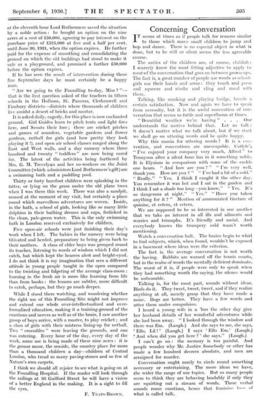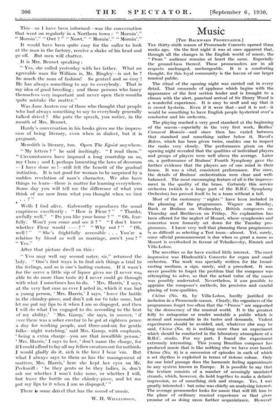Concerning Conversation
JT seems at times as if people talk for reasons similar to those which move small children to jump and hop and dance. There is no especial object in what is done, but to be still or silent seems the less agreeable course.
The antics of the children are, of course, childish : I scarcely know the most fitting adjective to apply to most.of the conversation that goes on between grown-ups. The fact is, a great number of people use words as school- girls use their hands and arms : they touch and press and squeeze and stroke and cling and maul with them.
Talking, like smoking and playing bridge, breeds a certain satisfaction. Now and again we have to speak from necessity, but it is the awful convention of con- versation that seems so futile and superfluous at times.
" Beautiful weather we're having " . . One understands the motive behind that. Let us talk : It doesn't matter what we talk about, but if we start we shall go on uttering words and be quite happy.
Why this mania for uttering words ? It is a con- vention, and conventions arc unescapable. Cady k's " I've enjoyed your company very much, Alfred" to Tennyson after a silent hour has in it something noble. It is Elysium in comparison with some of the cackle one hears. "And how are you ? " "I'm very well, thank you. How are you ? " "I've had a bit of a cold." "Really." "Yes. I think I caught it the other day. You remember it was hot and I sat in the garden and I think I sat a shade too long—you know." "Yes, It's so dangerous at night." "Yes." "Have you taken anything for it ? " Mention of ammoniated tincture of quinine, et cetera, et cetera.
We are supposed to be so interested in one another that we take an interest in all ills and ailments and worries and triumphs. It's friendly and social. And everybody knows the trumpery cold wasn't worth mentioning.
Watch a conversation halt. The brains begin to whirl to find subjects, which, when found, wouldn't be exposed in a basement where ideas were the criterion.
The fact is, the average conversation is not worth the having. Rabbits arc warned off the tennis courts, but in the realm of words the mentally deficient dominate. The worst of it is, if people were only to speak when they had something worth the saying, the silence would be unbearable.
Talking is, for the most part, sounds without ideas. Birds do it. They tweet, tweet, tweet, and if they realize anything at all, merely grasp that they have made a noise. Dogs are better. They have a few words and utter them under compulsion.
I heard a young wife in a 'bus the other day give her husband details of her wonderful adventures while she had been away. "I looked through the window and there was Ern. (Laugh.) And she says to me, she says, Ello, Lil ! ' (Laugh.) I says Ello Em.' (Laugh.) 'And when did you get here ? ' she says." (Laugh.) I can't go on : the memory is too painful. And people wonder why Mr. Justice Somebody or other has made a few hundred decrees absolute, and men are arraigned for murder.
Conversation ought surely to circle round something necessary or entertaining. The more ideas we have, the wider the range of our topics. But so many people seem to think they are behaving laudably if only they are squirting out a stream of words. These verbal sounds rouse emotions, hence that feminine lo,enf what is called talk.
This—so I have been informed—was the conversation that went on regularly in a Northern town : " Mornin'." " Mornin'." " Owt ? " "Nowt." " Mornin'." " Mornin'."
It would have been quite easy for the caller to -look at the man in the factory, receive a shake of his head and go off. But men will chatter.
It is Mrs. Bennet speaking : "Yes, she called yesterday with her father. What an agreeable man Sir William is, Mr. I3ingley—is not he ? So much the man of fashion! So genteel and so easy ! He has always something to say to everybody. That is my idea of good breeding ; and those persons who fancy themselves very important and never open their mouths quite mistake the matter."
Was Jane Austen one of those who thought that people who had always something to say to everybody generally talked drivel ? She puts the speech, you notice, in the mouth of Mrs. Bennet.
Hardy's conversation in his books gives me the impres- sion of being literary, even when in dialect, but it is pregnant.
Meredith is literary, too. Open The Egoist anywhere.
"My letters ? " he said incitingly. "I read them." "Circumstances have imposed a long courtship on us; my Clara ; and I, perhaps lamenting the laws of decorum —I have done so !—still felt the benefit of the gradual initiation. It is not good for woman to be surprised by a sudden revelation of man's character. We also have things to learn—there is matter for learning everywhere. Some day you will tell me the difference of what you think of me now from what you thought when we first Wells I find alive. Galsworthy reproduces the usual emptiness excellently : "How is Fleur ? " " Thanks, awfully well." "Do you like your house ? " "Oh, fear- fully. Won't you come and see it ? " "I don't know whether Fleur would ? " "Why not ? " "Oh, well ! " " She's frightfully accessible . . . You're a relation by blood as well as marriage, aren't you ? " " Yes."
After that picture dwell on this :
"You may well say second nater, sir," returned the lady. "One's first ways is to find sich things a trial to the feelings, and so is one's lasting custom. If it wasn't for the nerve a little sip of liquor gives me (I never Was able to do more than taste it) I never could go through with what I sometimes has to do. Mrs. Harris,' I says, at the very last case as ever I acted in, which it was but a young person, Mrs. Harris,' I says, 'leave the bottle in the chimley-piece, and don't ask me to take none, but let me put my lips to it when I am so dispoged, and then I will do what I'm engaged to do, according to the best of my ability." Mrs. Gamp,' she says, in answer, if ever there was a sober erector to he got at eighteen pence a day for working people, and three-and-six for gentle folks—night watching,' said Mrs. Gamp, with emphasis, 'being a extra charge—you are that inwallible person.' Mrs. Harris,' I says to her, don't name the charge, for If I could afford to lay all my fellow creaturs out for nothink, I would gladly do it, sich is the love I bear 'em. But what I always says to them as has the management of matters, Mrs. Harris,' here she kept her eyes on Mr. Pecksniff : be they gents or be they ladies, is, don't ask me whether I won't take none, or whether I will, but leave the bottle on the chimley-piece, and let me put my lips to it when I am so dispoged.' "
There is some drivel that has the sound of music.
W. H. WILLIAMSON'.































 Previous page
Previous page